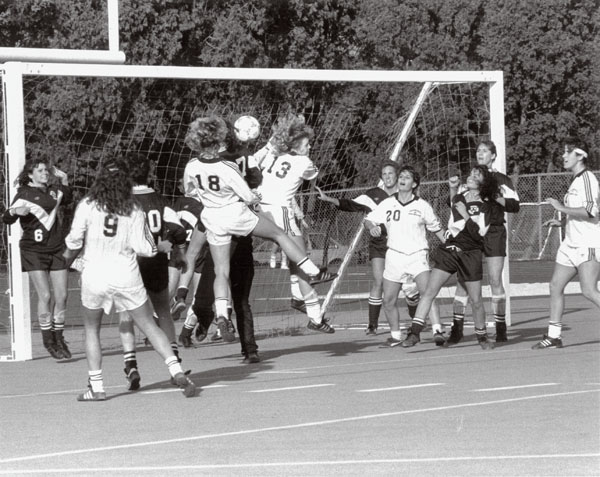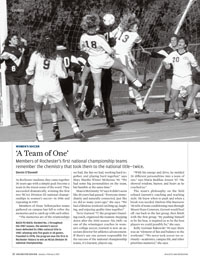In Review
 BACK-TO-BACK: Ranked No. 1 throughout the 1987 season, the women’s soccer team defended its 1986 national title in 1987, allowing only five goals in 18 games. Founded in 1978, the program was the first in Rochester history to win an NCAA Division III national championship. (Photo: Athletics and Recreation)
BACK-TO-BACK: Ranked No. 1 throughout the 1987 season, the women’s soccer team defended its 1986 national title in 1987, allowing only five goals in 18 games. Founded in 1978, the program was the first in Rochester history to win an NCAA Division III national championship. (Photo: Athletics and Recreation)Mind over Weather
Strategy isn’t reserved solely for the locker room or the playing field. At the 1986 women’s soccer Final Four in Cortland, New York, as the Yellowjackets were preparing to play their semifinal opponent, the University of California, San Diego, both teams were dining at the same restaurant—at different times—before the game.
Yellowjacket coach Terry Gurnett had an idea of how to get into the heads of the Tritons, new to late fall weather in upstate New York:
“I knew we’d run into them, so I instructed each member of our team not to wear any coats to the dinner. It was about 20 degrees out, and I knew the SD team would be bundled up tight. The SD players looked at us like we were crazy. Their coach saw us—John Leaney, a true coach, gentleman, and a friend to this day—and he said, ‘You bastard. I know exactly what you’re doing—hope you get frostbite!’ We had a great laugh but had drawn first blood.”
When the game was over, the Yellowjackets had two goals and a place in the 1986 championship game. —Dennis O’Donnell
As Rochester students, they came together 30 years ago with a simple goal: become a team in the truest sense of the word. They succeeded dramatically, winning the first two NCAA Division III national championships in women’s soccer—in 1986 and repeating in 1987.
Members of those Yellowjacket teams gathered on campus last fall to relive the memories and to catch up with each other.
“The memories are of the relationships we had, the fun we had, working hard together, and playing hard together,” says Mary Martha Winter McKenna ’90. “We had some big personalities on the team, but humble at the same time.”
Maura McGinnity ’87 says it didn’t seem like 30 years had passed. “Everyone immediately and naturally connected, just like we did so many years ago,” she says. “We had a fabulous weekend catching up, laughing, and enjoying quality time together.”
Terry Gurnett ’77, the program’s founding coach, organized the reunion. Stepping down after the 2010 season—his 34th—as one of the winningest coaches in women’s college soccer, Gurnett is now an associate director for athletics advancement. If there’s any one person responsible for the success of the national championship teams, it’s Gurnett, players say.
“With his energy and drive, he molded 26 different personalities into a team of one,” says Maria Budihas Jensen ’87. “He showed wisdom, humor, and heart as he coached us.”
The team’s philosophy on the field echoed Gurnett’s coaching and teaching style. He knew when to push and when a break was needed. Darlene Elia Buenzow ’88 tells of team conditioning runs through Mount Hope Cemetery. Gurnett would lead off, run back to the last group, then finish with the first group. “By pushing himself to be his best, it inspired us to be the best players we could possibly be,” she says.
 SOCCER CELEBRATION: Members of the 1986 and 1987 national championship women’s soccer teams were recognized during a celebration last fall: (front row, kneeling) Charlotte Tweedie Byers, Cindi Baker Wight, Jill Keller, Jody Morrow Moore, Cathy McQuiggen, and Liz Breyton Warmerdam; (middle row, crouching) Jill McCabe; (back row, standing) Maria Budihas Jensen, Maura McGinnity, Doreen Byers Falkowski, Jill Decker, Lisa Caracillo Anderson, Diane Perna Dacey, Jo Ann Johnston Allender, Darlene Elia Buenzow, Martha Winter McKenna, Abby Heister Steele, Kelly Gorman Rakowski, Cherise Galasso, and Annie Gaisser Holmok. (Photo: Athletics and Recreation)
SOCCER CELEBRATION: Members of the 1986 and 1987 national championship women’s soccer teams were recognized during a celebration last fall: (front row, kneeling) Charlotte Tweedie Byers, Cindi Baker Wight, Jill Keller, Jody Morrow Moore, Cathy McQuiggen, and Liz Breyton Warmerdam; (middle row, crouching) Jill McCabe; (back row, standing) Maria Budihas Jensen, Maura McGinnity, Doreen Byers Falkowski, Jill Decker, Lisa Caracillo Anderson, Diane Perna Dacey, Jo Ann Johnston Allender, Darlene Elia Buenzow, Martha Winter McKenna, Abby Heister Steele, Kelly Gorman Rakowski, Cherise Galasso, and Annie Gaisser Holmok. (Photo: Athletics and Recreation)Kelly Gorman Rakowski ’90 says there was an “element of fun and balance to the workouts.” “We never took soccer too seriously—academics, campus life, and other priorities mattered,” she says.
That would be a tough sell to the opponents in 1986 and 1987. On the field, the Yellowjackets defended expertly, attacking from the back to keep pressure on opponents. “There were 11 of us on defense, really 12,” says McKenna, “because of [goalkeepers] Doreen [Byers] and JoAnn [Johnston] sharing equal time every game. We were constantly threatening teams out of the back field and catching them man-down.”
Rochester had nine wins and two ties in the first 11 games in 1986. That included a 1–1 result at Cornell. “We realized that we might have something special,” Gurnett says. Two days later, Rochester lost at St. Lawrence, 4–0.
Gurnett calls the loss “sobering and instructive.” McGinnity thinks it was a positive. “That loss reminded us that you cannot take anything for granted. Success takes constant effort, teamwork, and a disciplined focus on a bigger purpose.”
Two wins followed, then a Senior Day loss to Rutgers. In the first round of the playoffs, Rochester won at Smith College in Massachusetts, putting the Yellowjackets into the Final Four against the University of California, San Diego.
The game was at Cortland State in New York’s Finger Lakes region, about two hours from Rochester. “We woke up and there was snow on the ground,” Buenzow says. “We knew San Diego didn’t stand a chance against us tough Northerners.”
A 2–0 win put Rochester into the final against Plymouth State. The winning goal came from a pass by McGinnity to freshman Lisa Caraccilo ’90 for a 1–0 victory.
The tough defense of 1986 was stronger a year later—only five goals allowed in 18 games. Carrying a No. 1 ranking throughout the 1987 season, the Yellowjackets again advanced to the Final Four, winning the title over William Smith College, 1–0, at Fauver Stadium. “Not many teams in sports actually accomplish or fulfill their expectations,” Buenzow says. “We did.”
Sometimes, it does seem like yesterday. “I can still feel the sense of joy when Abby Heister headed in the goal,” Rakowski says of the 1987 final. “I knew that would be it.”
Gurnett puts it in perspective differently. “We made the effort to get ‘good folks’ on the team,” he says. “It’s amazing what you can accomplish with the proper mix of character, talent, and grit.”
“Terry recruited good people who came together with many a personality, but all seemed to click both on and off the field,” says McKenna. “We still do.”
Dennis O’Donnell is director of communications for the Department of Athletics and Recreation

